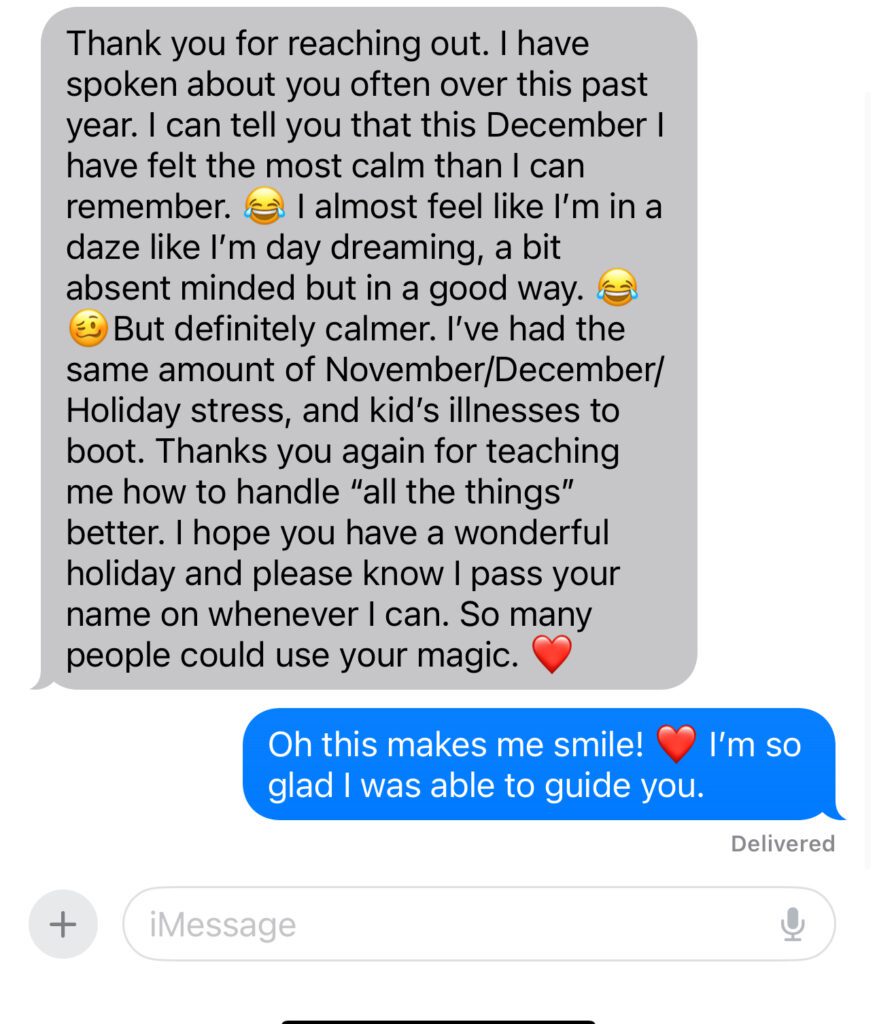If people in my house stopped doing stupid things, I wouldn’t yell!

Let’s chat about something that significantly impacts how you respond and react to those you love – regulating your emotions. It’s more than just managing anger; it’s about creating a calmer, more peaceful environment for yourself and your family.
You’ve promised yourself you’re going to stop yelling, snapping, and mentally spiraling when something happens. The problem isn’t them; it’s that you’re not regulated. Here’s the thing, you can’t change them, haven’t you tried? To create more calm you have to change yourself. I work with my clients for weeks on this, so it’s not going to change overnight but know it’s possible to change how you respond.
Here’s a quick overview to help you regulate your emotions and create a more harmonious household.
Regulation Killers
- Stress
- Impact: Stress from managing daily responsibilities can lead to outbursts. When you’re overwhelmed, it’s easy to snap at your kids or spouse.
- Solution: Identify stressors and find ways to remove, delegate, or automate tasks. Practice mindfulness techniques to stay grounded. Taking breaks and scheduling self-care activities can reduce stress levels.
- Lack of Sleep
- Impact: Sleep deprivation can make you irritable and quick to anger. Without adequate rest, it’s challenging to maintain emotional control.
- Solution: Prioritize sleep by establishing a bedtime routine. Create a restful environment and avoid screens before bed. Aim for 7-9 hours of quality sleep.
- Unresolved Resentment
- Impact: Holding onto grudges or unresolved issues can lead to frequent arguments and frustration. This often stems from wanting someone to change. Keeping score is another regulation killer, this impacts your ability to love and effectively communicate. All of these things affect your ability to respond calmly.
- Solution: Address issues as they arise. Practice forgiveness and let go of past grievances. Don’t try to change others. Open communication, allowing others to be themselves and setting healthy boundaries can prevent resentment from building up.
Step Away from Situation
- Recognition: Recognize when you’re getting upset and give yourself permission to step away.
- Reset: Take a moment to breathe, reset, and return with a calmer mindset.
- Breathing and Mindfulness: Practice deep breathing or a quick mindfulness exercise to regain composure.
- Physical Activity: Engage in a brief physical activity, like a 2 minute walk or stretching, to release tension.
Creating Calm Before You’re Triggered
- Daily Rituals: Create daily rituals that promote calmness, such as morning meditation or a nightly gratitude practice.
- Self-Compassion: Be kind to yourself. Understand that it’s okay to have difficult moments. Practice self-compassion and give yourself grace.
- Seek Joy: Do things that bring you joy. Whether it’s enjoying a cup of tea or a walk in the park, embrace the moments that bring you happiness. You must do “joy acts” to create some internal joy, otherwise you will feel as if you’ve lost your way – you don’t know who you are anymore..
Allowance of Who Others Are in the Moment
- Acceptance: Allow your child or husband to be who they are. You can’t force them to change. You can have boundaries, that’s it. Everyone is different and does things differently, no one will do things like you.
- Recognition: Recognize that this is how a 16-year-old who doesn’t get their way behaves. This is how your mother-in-law, husband, employee, etc. behaves when ___ happens.
- Patience: Just like you have your moments, let them have theirs. It doesn’t mean anything about you.
- Understanding: Show empathy and understanding, acknowledging their feelings. It doesn’t mean you agree with them but as a fellow human you acknowledge that this is how they feel.
- Supportive Environment: Create a supportive environment by being patient and non-judgmental.
Mentally Find Things That Are Going Correctly
- Positive Focus: Don’t just look for the bad and ugly. Solve problems but focus on the good.Make a conscious effort to notice and appreciate the positive things happening around you. Sometimes the only good I can find in a day is a great cup of coffee and that’s okay.
- Gratitude Journal: Keep a gratitude journal to highlight the good moments each day.
- Celebrate Small Victories: Celebrate small victories and progress, no matter how minor they may seem.
- Reflection: Use this time to reflect on your feelings and identify triggers.
Mindfulness and Self-Regulation
- Breathing Exercises: Practice deep breathing to calm your nervous system. Inhale deeply for a count of four, hold for four, and exhale for four.
- Mindful Awareness: Be present in the moment. Notice your thoughts and feelings without judgment. This helps you respond rather than react impulsively.
- Journaling: Write down your thoughts and emotions. This can help you process feelings and identify triggers.
Physical Techniques
- Exercise: Physical activity releases endorphins, reducing stress and improving mood. Incorporate regular exercise into your routine, whether it’s yoga, walking, or a workout.
- Cold Therapy: Techniques like cold showers or ice baths can help reduce stress and increase resilience. They stimulate the vagus nerve, promoting calm.
- Box/Square Breathing: Inhale for four counts, hold for four, exhale for four, and hold for four again. As you do this, imagine drawing a box with your nose: move your head up while inhaling, to the right while holding, down while exhaling, and to the left while holding. Repeat 8-10 times. It’s important that your stomach and back expands and feels tight during inhalations.
- Relaxation Practices: Engage in activities that promote relaxation, such as meditation, stretching, or getting a massage.
Regulating your emotions is about creating a peaceful and loving environment for yourself and your family. Practice these strategies to stay calm, connect with your loved ones, and enjoy a happier, more balanced life.
Are you struggling to be calm with those you love? I can help guide you.
See what this client said about her life after working with me!
